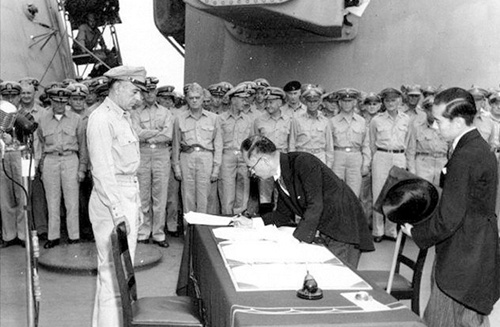
. > WHAT'S NEW > RESEARCH
Multilateral cooperation needed to prevent next WWII tragedy
Author : ZHANG JUNRONG and ZHANG YIXIN Source : Chinese Social Sciences Today 2020-06-08

Japanese representatives signed a declaration of surrender on Sep. 2, 1945, marking the complete failure of Japanese militarism and the ultimate victory of the war against fascist states. Photo: FILE
This year marks the 75th anniversary of the end of the World War II, which was an unprecedented catastrophe in human history. Since the end of WWII, China has firmly defended the fruits of victory, maintained the ideals of international fairness and justice, and supported and practiced multilateralism. China has always been a contributor to world peace, a facilitator of global development and a defender of international order.
History cannot be denied, and neglecting its lessons is a form of betrayal. The Chinese People’s War of Resistance Against Japanese Aggression and the world’s anti-fascist war were a decisive battle between justice and evil, brightness and darkness, progress and reaction. To better remember history, we must first acknowledge historical facts and cherish hard-won peace.
The War of Resistance Against Japanese Aggression persisted for 14 years from 1931 to the victory in 1945. The Chinese people made huge sacrifices for the victory of the main battlefield in the East and made great contributions to the victory of the world’s anti-fascist war. The anti-Japanese war also received widespread support from the international community, and the Chinese people will always remember the contributions made by the people of other countries to the victory of the war.
WWII was a tragic product of a world system dominated by European powers, said Tian Dewen, a research fellow from the Institute of European Studies at the Chinese Academy of Social Sciences. The disastrous war made countries around the world realize that they shouldn’t continue with the same concepts of international relations that had been espoused by those great powers.
Chen Yugang, a professor from the School of International Relations and Public Affairs at Fudan University, said that the significant impact WWII had on the world should be remembered and is worth reflecting on. The war caused grave casualties, forcing countries across the globe to become deeply aware of the dangers of fascism. The resistance against fascism at the time provided valuable experience for the cooperation of the international community. The war heavily hit European imperialism and colonialism, promoting the awakening of the Asian and African people and their struggle for national independence. It also promoted the establishment of a post-war order based on anti-fascism as a basis for future cooperation and values.
Wang Mingjin, a professor from the School of International Relations and Diplomacy at Beijing Foreign Studies University, said that after the outbreak of WWII, the world’s peace-loving forces formed an anti-fascist alliance and a united front to fight the common enemy, finally achieving victory. When confronting a common enemy, all countries in the world must work together to oppose aggressive nationalism and extreme ideas and safeguard world peace.
In the face of a global crisis, more attention should be given to countries with relatively weak coping capacities, said Wang Yiwei, a professor from the School of International Studies at Renmin University of China. While taking necessary action to protect their own profits, economically advanced countries can invest more public health resources and economic resources into vulnerable countries and emerging markets.
Wang Mingjin added that at present, economic globalization is facing the challenge of deglobalization, and various “economic decoupling” theories are emerging. Mankind is a community with a shared future. We need to bear in mind the disasters caused by WWII and strengthen multilateral international cooperation.
We should keep in mind the historical lessons of fascism and always be vigilant against the resurgence of fascism. Multilateralism is the cornerstone for the international community to respond to common challenges and the basic principle to maintain international order. The community of shared future for mankind is a guiding concept and value orientation to practice multilateralism, Chen said.
Currently, the international community is fighting against the COVID-19 pandemic. The international community should carry forward the spirit of solidarity reflected in the anti-fascist war, actively build a community of shared future for mankind and work together to win these unique battles which affect the health and safety of peoples around the world.
Wang Mingjin said that the European people actively learned lessons from WWII and started the process of European integration, which has for a long time suppressed nationalism and extreme thought, and maintained long-term peace in Europe and the world.
History has taught us that only firm maintenance of the multilateral world system can bring lasting peace and prosperity to mankind. In the new era, China’s foreign policy based on the Five Principles of Peaceful Coexistence, the pursuit of partnership but not alliance, and the concept of a community of shared future for mankind, is in line with the positive development of human society, Tian added.
(Edited and translated by YANG LANLAN)
Ye Shengtao made Chinese fairy tales from a wilderness
Ye Shengtao (1894–1988) created the first collection of fairy tales in the history of Chinese children’s literature...
-
How northern ethnicities integrated into Chinese nation
2023-09-18
-
Mogao caves
2023-09-12
-
Mogao Grottoes as ‘a place of pilgrimage’
2023-09-12
-
Time-honored architectural traditions in China
2023-08-29
-
Disentangling the civilizational evolution of China
2023-08-28
-
AI ethics in science fiction
2023-08-23













 2011-2013 by www.cssn.cn. All Rights Reserved
2011-2013 by www.cssn.cn. All Rights Reserved